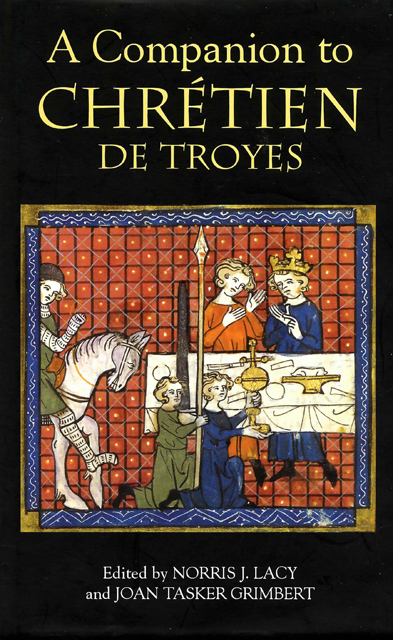4 - The Arthurian Legend Before Chrétien
Published online by Cambridge University Press: 23 March 2023
Summary
It is both traditional and correct to identify Chrétien de Troyes as the creator of Arthurian romance and as the writer who inaugurated a number of Arthurian motifs and themes. Those include Camelot, Lancelot, the Grail; the nature of the court and of a good many Arthurian characters; and above all, the complex quest structure resting on the opposition of public v. private responsibilities, of the individual (or couple) v. society, occasionally of love v. chivalry itself.
However, preliminary to a study of Chrétien's accomplishment is a review of the Arthurian legend before his time. Much of the material concerning that legend, though, is necessarily irrecuperable, since there must have been a great many Arthurian stories that circulated orally, in Celtic and other languages, but either were never written or were recorded in texts that have not survived. That such stories existed within oral tradition cannot be in doubt, but neither can the information about them be corroborated with confidence, and authors’ statements to the effect that ‘the story says …’ or that ‘I have heard it said …’ may often be nothing more than commonplaces or efforts to support their texts with the authority of pre-existing narratives.
The following census of early Arthuriana will not tell us what sources Chrétien may have known and drawn upon directly, with the single exception of Wace's Roman de Brut, written in 1155. Because Wace was the first to speak of the Round Table, and because he first put into French the narrative of Arthur's life and career – though without many of the characters and events that were later to become a regular part of the story – Chrétien clearly knew and used Wace's work (for which see below). He may also have known Wace's source, Geoffrey of Monmouth's Historia regum Britannie, but that is not certain.
Chrétien himself speaks of sources but gives us little information about what they may have been. In all five of his Arthurian romances, he makes tantalizing but frustrating allusions to pre-existing material that he is adapting for the public. In his first romance, Erec et Enide, he refers to the story of his hero and contends that the storytellers who have recounted it previously ‘depecier et corrompre suelent’ [habitually mangle and corrupt it]. His second Arthurian composition, Cligés, opens with a list of Chrétien's previous works (including some that may or may not have existed) and then announces that the story he is now going to tell is found in a book from the library of St Peter's Church in Beauvais.
- Type
- Chapter
- Information
- A Companion to Chrétien de Troyes , pp. 43 - 51Publisher: Boydell & BrewerPrint publication year: 2005



